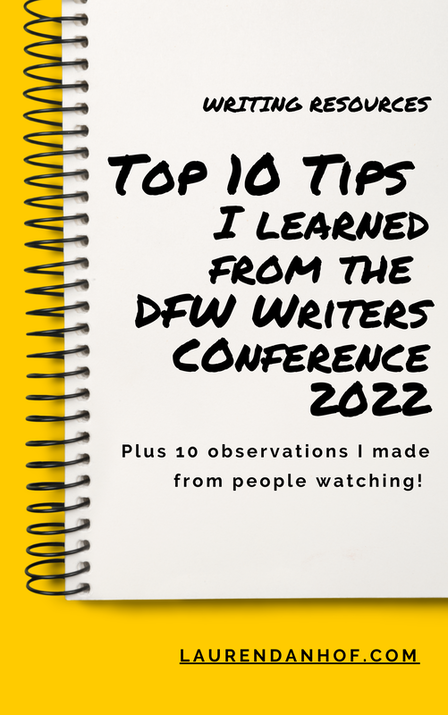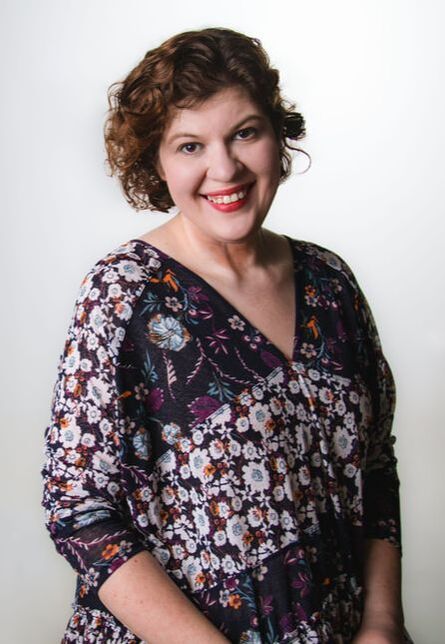|
Oh my goodness it felt so amazing to be back! The energy, the ideas, the flowing creativity, the cheesecake! I thought I’d take a moment to share some of what I got out of the conference this weekend.
I’ve started each tip with the class I was in when something really spoke to me. Give them all a chance, even if it’s not your genre. I’m not a mystery writer, but some of the best ideas came from the mystery class taught by Jessica S. Olson! Top 10 Tips I Learned from this Year’s DFW Writer’s Conference 2022 1.Mastering Mood: Mood doesn’t happen by accident. Don’t assume the mood is a given. Not all weddings are romantic, not all funerals are sad. Imbue mood by emphasizing elements that enhance the mood you want, and downplaying the elements that distract. Plus, characters’ thoughts and feelings don’t create mood (at least not by themselves). 2.Mastering Mood: FOCUS. Focus is the real-estate of the page. This is probably the best thing I picked up this weekend, if forced to choose. You only have so much space so every word has to count, has to have purpose. What you choose to focus in on is what creates mood for the reader. (A. Lee Martinez and Sally Hamilton) 3.Writing Historical Fiction: Instead of over-researching, if you find yourself stuck in a blind spot of historical detail, avoid it and concentrate on the universal human experience. The ocean smells the same as it did a hundred years ago. (Jenny Bhatt) 4.Marketing for Traditionally Published Authors: This was a fantastic class for those of us new to the world of marketing. There were so many tips I couldn’t possibly list them all here, from social media to book launches to so much more. As my publishing journey continues, I plan to update this blog with the things I learned in the class. However, the most important I took away was this: Make a reasonable goal and celebrate the small things! My goal has been to hold my published book in my hands. Things will go wrong and that’s okay. We have to take the wins where we can. (Dana Swift) 5.YA Panel: Teenage years are some of the toughest years in a person’s life and we often carry that trauma with us into adulthood, which is why YA attracts teens, as well as, adults. YA authors have a special power and responsibility for their younger audience. (Julie Murphy, Jessica S. Olson, Robin Roe, Dana Swift, and Leslie Lutz) 6.Strong Women Panel: Disclaimer, I was on this panel, but I still learned a lot! Strong women characters are strongly written characters. (A. Lee Martinez, Jenny Martin, Lauren Danhof, and Amanda Arista) 7.Romance Panel: The real destination is emotional understanding, not the climatic kiss. 8.Romance Panel: When you fall out of love, it’s because something within yourself is out of sync. The answer to having characters overcome this and fall in love or back in love is personal growth and development. You have to know yourself to know what you want and to communicate that to another person. (Julie Murphy, Heather Graham, Ellis Kaye, Amanda Arista, and Dana Swift) 9.Mystery: Writing a mystery is like creating a backwards treasure hunt. Start with the “Big Reveal” or “twist” and work backward. Create clues. The speaker even suggested writing the clues on index cards and then playing around with where to put them in the book. Each clue needs to claw at the Main Character’s flaws or misbelief. Which leads to tip number 10… 10.Mystery: A good mystery allows the Main Character to grow and develop. The course of solving the mystery must make the MC reckon with their own flaws and misbeliefs. In other words, just like in other genres, a mystery isn’t actually about the plot, it’s about the characters and making the reader care. (Jessica S. Olson) Additionally: a.How is the MC entangled in the crime? There needs to be a reason. b.Why is it meaningful to them? c.How will it change them? (You should know by now that when I do a top 10 list it always goes over 10) 11.Mystery: The perpetrator must also be a fully developed character. They must be the foil to the MC. Additionally: a.The perp must have a reasonable (not excusable) motive for committing the crime. b.It’s helpful to write the scene where the perp commits the crime for yourself and not include it in the book. c.The perp is the hero of their own story… which leads me to tip #12 from the Villains class… 12.Villains: Again, the villain is the hero of their own story. They need a clear connection to the MC and a backstory of their own that can give reasons for their diabolical motivations. Above all, they believe they are doing the right thing. 13.Villains: Villains should be fleshed out and interesting. They can terrifying, humorous, or both. They must be compelling. (Leslie Lutz) 14.Idea Crockpot: I LOVED this class. I had never thought about generating ideas in an organized manner. I thought waiting for inspiration and then writing it on my hand and hoping for the best was the way to go. Collect ideas, snippets, and observations, even if, and especially if you don’t know how it could relate to a story. Store them in any number of databases: Pinterest, Google Keep, a physical journal, etc… The one place you shouldn’t store them is your brain, because they won’t stay there long. (Rosemary Clement & Rook Riley) Top 10 Observations I made from People Watching this weekend: 1.Writers are some of the friendliest people. Seriously. Everyone is so approachable and kind. We are working towards the same goals. We all enjoy the same activities. And even though we are all very different, we are united by the passion we share. Thanks for being friendly, y’all! 2.Some writers are far too critical of their own writing. You are your own worst critic. Don’t EVER apologize for your writing. The only way to fail at writing is to quit writing. 3.Some writers take themselves far too seriously… and by that I mean, dude, you’re going to give yourself a stress ulcer. Some people (just a few) were laser focused on particular goals, whether that was to pitch to a certain agent or get a specific question answered about their WIP. Nothing wrong with that, but it’s okay to relax and enjoy your time at a conference. Make friends, don’t think about your book for an hour. It’ll be okay. And if things don’t go your way, you don’t get the agent you wanted, at least you’ll leave with new friends and new connections. 4.Some writers talk about their WIP too much. (Ahem) We’ve all been there. We meet a nice conference goer and ask what they write. Then we get a thirty minute, one-sided conversation about their 25 book series. I want to hear about what people are working on… but you have to understand, talking about your book is never going to be as satisfying as reading your finished book. As A. Lee Martinez said during a panel, “Every story sounds stupid when you say it out loud.” So, please, talk about your book, but be brief and concise, wait for questions, and return the favor by asking about their WIP! 5.Some writers don’t talk about their WIP enough. At the same time, some people seemed reluctant to discuss their WIP. Maybe they were introverts. Maybe they were afraid someone might steal their idea. (By the way, you shouldn’t worry about that. Even if someone steals your idea, they can’t write the same book as you.) We’re all cool people, it’s okay to talk about your book. We want to know! 6.There are as many different kinds of writers as there are stories to be told. The breadth of stories I heard about this weekend was astounding. People say we’re running out of ideas. Nonsense. Every story is as unique as the person who wrote it. 7.Some writers are extroverts. Hey, yeah, I’m talking to you, the one who thrives on crowds and talking and can’t get enough of it. Good for you! Seriously. That’s awesome. Just don’t forget about the shy people who might need a little push to speak up. Don’t leave anyone out. 8.Some writers are introverts. Hey, yeah, I’m talking to you, and myself, the one who is an introvert and can act like an extrovert, but finds it completely exhausting. Ya did good, kid. You put yourself out there and you flourished. No, don’t think about how you could have said something better, don’t worry that you were “bothering” people by simply joining a conversation. Now go rest and reenergize! 9.All writers are eccentric in their own way. Y’all are a bunch of weirdos! But we’re all weirdos together! Yay! 10.All writers who come to a conference are ready and willing to grow. You are heads above the average writer because you are seeking out opportunities for growth and knowledge. You’re going places, keep it up! I could go on and on, but if a blog post is real-estate, I must be choosey. Also, I didn’t get to go to all the classes I wanted to. So what did you learn that I missed? Let me know in the comments of my blog!
1 Comment
|
AuthorWriter, photographer, millennial, mother, and over-thinker Archives
July 2023
Categories |


 RSS Feed
RSS Feed